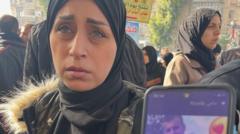In the heart of Damascus, Mustahed Hospital has unexpectedly become a grim site of hope and despair for many Syrians. Families, haunted by the memories of their missing loved ones, flock to the hospital's walls adorned with photographs of deceased men—most believed to be victims of the Assad regime's relentless brutality. The faces displayed tell stories of suffering, twisted by the agonies endured in prison, a stark reminder of the regime's unchecked power over the past 50 years.
Among the throng of visitors are the wives, siblings, and parents of the deceased, each seeking answers to the painful question of what happened to their loved ones. Only a few weeks have passed since these bodies were brought to the hospital, and the overflow morgues speak volumes of the surge in fatalities experienced by Syrian prisoners. This painful search is deeply personal, as families hope to find a body to bury, a sense of closure that has long eluded them.
Inside the mortuary, witnesses describe a harrowing scene as they identify the deceased. Victims display signs of severe abuse, with doctors noting bruising, fractures, and emaciation. The process of identification unfolds with agonizing intensity; forensic specialists like Dr. Raghad Attar assemble evidence to aid in recognizing the dead while confronting their own emotional turmoil. "I hope the future will be better, but this is very hard," she says, shedding tears for the families grappling with immense loss.
For many families, this search is not merely about finding a body, but about unearthing the truth. The stories of loss span years, with innocent individuals swept away by the brutal regime during checkpoints or raids—a mother seeking her son taken 12 years ago, a sister who long ago received only a Facebook post about her brother's imprisonment. The pain resonates deeply and collectively among these families, fueling a longing for justice and resolution.
Onlookers outside the presidential palace, a symbol of the Assad family's historic power, reflect on the broader implications of the regime's 50-year reign, where surveillance and fear permeated their lives. The citizens of Syria have borne the cost of the Assads’ oppressive legacy, witnessing firsthand the disappearance of thousands, for whom memory and mourning are all that remains.
In the wake of recent turmoil following the regime's rumors of executions of its henchmen, the quest for justice continues. A crowd gathered in hope of witnessing retribution against a notorious executioner—evidence of the intense desire for accountability spreading among the populace. But the depth of anger and grief suggests that the transition away from dictatorship will not be easily attained.
As Syrians navigate this tumultuous chapter of their history, they are united by the need to confront their past, ensure that the losses of their loved ones are not forgotten, and to seek a future free from fear. The journey toward recovery remains fraught with challenges, but the voices rising in protest suggest a flicker of hope amid the ashes of despair.




















